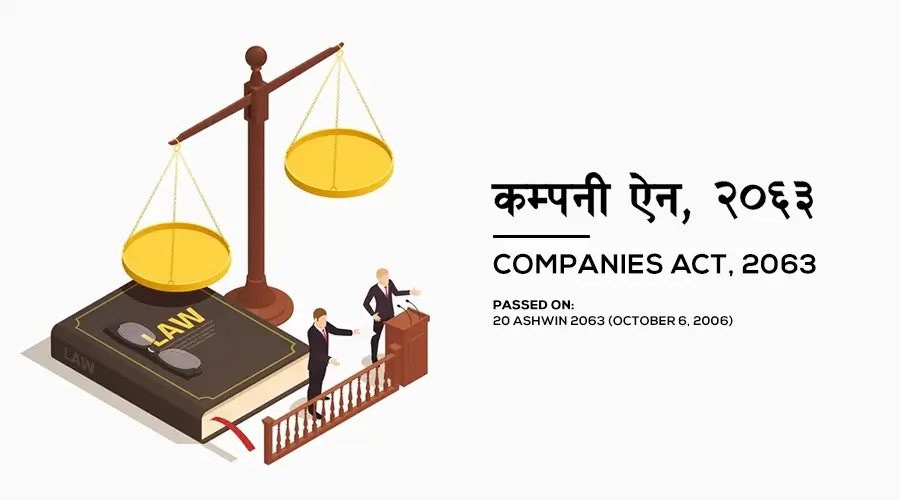Companies Act 2063 in Nepali and English

The Companies Act, 2063 (2006), is a set of rules in Nepal that govern how companies are created, operated, and managed. In Nepali, it is called ‘कम्पनी ऐन २०६३‘ (Companies Act 2063).
The Act was passed on 20 Ashwin 2063 in the Nepali calendar, which corresponds to October 6, 2006, in the English calendar.
The main objective of this Act is to encourage investment in industry, trade, and business by simplifying and making transparent the process of starting, operating, and overseeing companies.
The Companies Act, 2063, defines different types of companies, such as private, public, holding, subsidiary, and foreign companies. It also outlines the roles and duties of key figures in these companies, such as directors, chief executives, managers, company secretaries, and liquidators.
Furthermore, the law includes various terms such as memorandum of association, articles of association, prospectus, shares, preference shares, ordinary shares, and bonus shares. These terms help clarify and standardize the language used in the context of companies covered by the Act.
Key provisions of the Companies Act 2063 Nepal include:
- Types of Companies: The law talks about different types of companies, like private limited companies, public limited companies, and non-profit companies. Each type of company has its own specific rules and regulations.
- Incorporation: The Act tells us how companies are created and registered. This includes rules like requirements for name reservation, minimum capital, and registration documents.
- Share Capital: The Act regulates how shares are issued, transferred, and maintained by companies. It also sets rules for share certificates and the share register.
- Corporate Governance: The Act explains what directors, officers, and shareholders should do. It also guides companies on operating properly, such as holding yearly meetings, maintaining records, and managing other important tasks.
- Financial Reporting: The Act says that companies need to report their finances and have them checked by auditors. It also explains how to create and send financial statements and choose auditors.
- Dissolution and Insolvency: The Act also has rules for ending and closing down companies. It has guidelines for when companies can’t pay their debts and what happens if they go bankrupt.
- Compliance and Penalties: The Act decides the punishments for people or companies breaking its rules. It also explains how the government ensures everyone follows these rules.
- Regulatory Authority: In Nepal, there’s an office called the Office of the Company Registrar (OCR). This office makes sure that the rules in the Companies Act are followed. They make sure companies register properly and follow the rules correctly.
Companies Act 2063 in Nepali
The PDF copy of the Companies Act 2063 was download from the Office of the Company Registrar.
Company Act 2063 in Nepali: Download
Companies Act 2063 in English
The PDF copy of the Companies Act 2063 was download from the Office of the Company Registrar.
Company Act 2063 in English: Download


